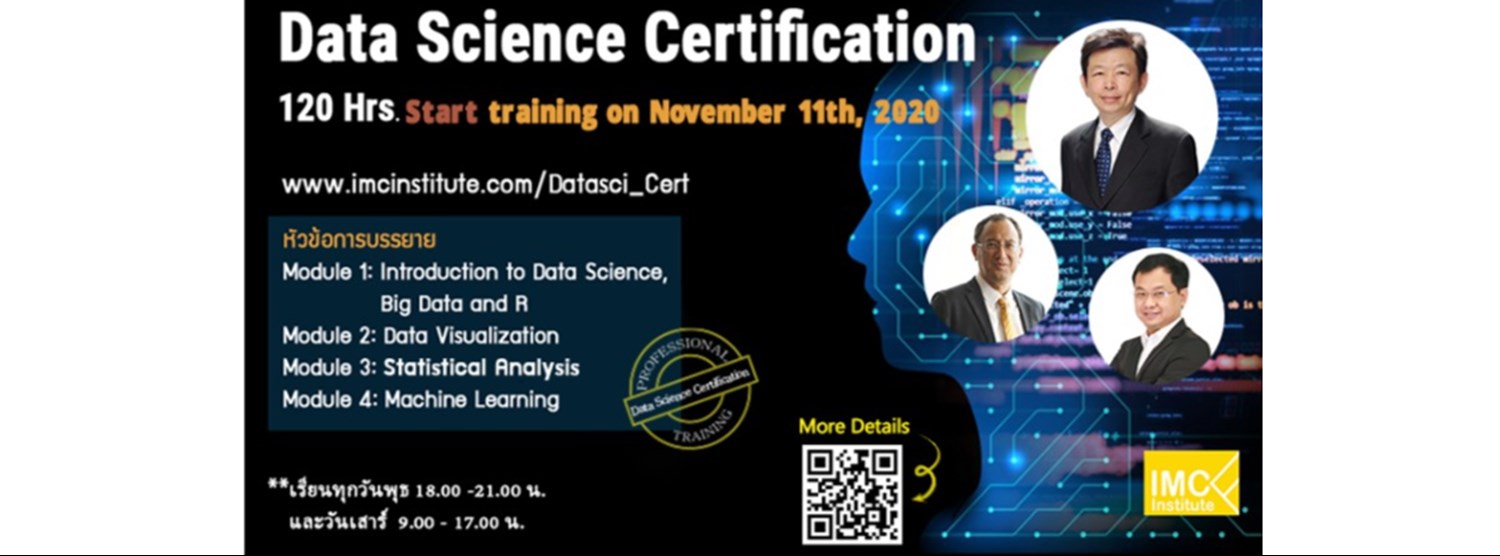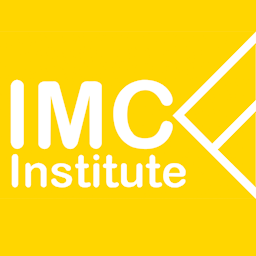คำอธิบายรายวิชา
Data Science เป็นการค้นหา Pattern จากข้อมูลขนาดใหญ่ เพื่อสนับสนุนการตัดสินใจ โดยใช้ ข้อมูลขององค์กร บริษัทในปัจจุบันใช้ความสามารถทางด้าน Data Science ทำให้เกิดความได้เปรียบ ในการแข่งขัน (Competitive Advantage) เหนือกว่าคู่แข่ง
หลักสูตร Data Science Certification นี้เป็นการรวบรวม หลักสูตรหลายๆ หลักสูตร เพื่อให้ผู้เรียนได้รับความรู้ และการลงมือปฏิบัติ เพื่อให้ท่านได้สามารถ เรียนรู้ ศาสตร์ที่กำลังพัฒนาและปรับเปรียนตัวเองอย่างรวดเร็ว ท่านจะสามารถเข้าใจการใช้เทคโนโลยี ที่เกี่ยวข้องเช่น Hadoop, Spark, NoSQL และ ภาษา R ที่จะทำให้ท่านมีความรู้ในการวิเคราะห์ข้อมูลต่างๆ
หลักสูตร Data Science Certification เป็นหลักสูตร 120 ชั่วโมงที่ต้องการพัฒนาให้ผู้เรียนได้เข้าใจถึงเรื่องของ Data Science ตลอดจน ความรู้ในการทำ Big Data ตั้งแต่วางกลยุทธ์ จนถึงการทำ Predictive Analytics ด้วย Large-Scale Machine Learning การสอนในหลักสูตรนี้ประกอบไปด้วยการบรรยาย การทำ Workshop โดยจะมีการติดตั้งใช้เครื่องมือ Big Data จริงๆที่สามารถทำงานได้ รวมถึงการใช้งานบนระบบ Cloud
ทางสถาบัน ไอเอ็มซี จึงได้รวบรวมวิทยากร และปรับเนื้อหาให้สอดคล้องกับ เทคโนโลยีที่มีเข้ามาเพิ่มเรื่อยๆ ในหลากหลายมุมของการนำ Data Science ไปใช้ เป็นหลักสูตร 4 เดือน
ระยะเวลาอบรม : 120 ชั่วโมง
- เรียนทุกวันพุธตอนเย็น 18.00 -21.00 น. และวันเสาร์ 9.00 - 17.00 น.
- รุ่นที่ 2 เริ่มเรียน 11 พฤศจิกายน 2563
-
กำหนดการอบรม
Module 1: Introduction to Data Science, Big Data and R
Module 2: Data Visualization
Module 3: Data Science: Statistical Analysis
Module 4: Data Science: Machine Learning Algorithm
ค่าอบรม : 59,000 บาท ไม่รวม VAT
(ค่าอบรมรวม ค่าเอกสารอบรม ค่าใช้งาน Cloud Services ค่าอาหารกลางวัน อาหารว่าง และ อาหารเย็นวันพุธ)
วัตถุประสงค์ของการอบรม
หลักสูตรการอบรม120 ชั่วโมงนี้ มีวัตถุประสงค์เพื่อให้ผู้เข้าอบรมได้รับความรู้ด้านต่างๆดังนี้
- มีความเข้าใจ ทักษะในการบริหาร วงจรชีวิต (Lifecycle) ของ Data Science
- สามารถเขียนโปรแกรมวิเคราะห์ข้อมูล โดยใช้ภาษา R
- เรียนรู้หลักการของ Data Science และอัลกอริทึมในการพยากรณ์ข้อมูลต่างๆ ทั้งแบบที่เป็น Classification/Regression และ Clustering ด้วย Large-Scale Machine Learning
- เรียนรู้ เทคนิค Neural Network และ Deep Learning
- เรียนรู้เครื่องมือในการทำ Data Visualization
- การสร้างโครงการ Data Science บนข้อมูล Big Data
- เข้าใจหลักการของ Big Data และแนวโน้มของเทคโนโลยีด้านข้อมูล
- เรียนรู้การใช้งานเทคโนโลยี Hadoop และเทคโนโลยีที่เกี่ยวข้องอาทิเช่น Spark และอื่นๆ ในด้าน Computation, Storage และ Ingestion
วิทยากร:
รูปแบบการอบรม:
- การบรรยาย 40% ปฏิบัติการ 60%
- การทำ Hand-on Lab ติดตั้งระบบจริง และการใช้ Big Data as a Service
- การพัฒนาโปรแกรมต่างๆ
- การทำ Workshops
- การทำ Mini-Project ทางด้าน Data Science
บุคลากรที่ควรเข้าร่วมการอบรม
บุคคลทั่วไปที่สนใจจะพัฒนา Big Data และต้องการเป็น Big Data IT Professional หรือ Data Scientist โดยต้องมีความรู้พื้นฐานด้านไอทีมาเป็นอย่างดี มีความรู้เรื่องฐานข้อมูล และการเขียนโปรแกรมมาบ้าง
คุณสมบัติเบื้องต้นของผู้เข้าร่วมการอบรม
- ต้องมีประสบการณ์การทำงานด้านไอทีมาอย่างน้อย 2 ปี
- ควรมีความรู้พื้นฐานเรื่องระบบฐานข้อมูล
- มีพื้นฐานด้านการพัฒนาโปรแกรมภาษาใดภาษาหนึ่ง
สิ่งที่จะได้จากการอบรม:
- เข้าใจหลักการของ Data Science
- เข้าใจเทคโนโลยีต่างๆของ Big Data ที่ใช้ใน การทำ Data Science Project
- การใช้เครื่องมือต่างๆที่เกี่ยวข้องกับ Big Data เช่น NoSQL, Hadoop, BI Tools และ Machine Learning Tools
- เรียนรู้การใช้ Big Data as a Service บน Cloud Platform
- สามารถใช้ BI Tools ที่เป็น Open Source Tools ได้
- เรียนรู้ด้าน Data Science ในเชิงลึก อัลกอรึทึมสำหรับ Machine Learning ประเภทต่างๆ และการทำ Predictive Analytics ด้วย Large-Scale Big Data
- การใช้ Data Science Platform เช่น Tensorflow Keras และ Pytorch เป็นต้น
- การพัฒนา Application โดยใช้งาน Data Science
การทบทวนเนื้อหาที่ได้รับการอบรม
- จะมีการอัดคลิปการอบรมเพื่อให้สามารถทวบทวนย้อนหลังได้ โดยจะใช้วิธีการอัดเสียงและหน้าจอของวิทยากร
- จะจัดเตรียม source code ต่างๆให้อยู่ใน Github
ระบบ Computer Cluster ที่จะใช้ในการอบรม:
ในการอบรมนี้จะมีการติดตั้งระบบ Big Data Cluster ที่สามารถรองรับข้อมูลขนาดใหญ่ที่สามารถใช้งานได้จริง โดยจะใช้ Server ของ Google Cloud Platform ให้ผู้เรียนได้ติดตั้ง Hadoop Cluster โดยใช้ Server จำนวนหลายเครื่อง และจะมี Hadoop Cluster ที่เป็น Google DataProc ที่สามารถรองรับข้อมูลขนาดใหญ่จำนวนเป็น GByte เพิ่อให้ผู้เข้าอบรมได้เรียนรู้การทำงานจริงๆ
เทคโนโลยีที่จะใช้ในการอบรม
- เทคโนโลยีด้าน Big Data
- Hadoop Cluster using Apache and Cloudera Distribution
- Hadoop Cluster on Google Cloud Platform
- Tensorflow
- Keras
- ภาษาที่จะใช้ในการประมวลผลข้อมูล
- R, RStudio
- Map/Reduce using Spark
- Node.js
- เทคโนโลยีด้าน Cloud Computing
- Google Cloud Platform
- Google Big Data as a Service
- Amazon Web Services using EC2, S3 and EMR
เนื้อหาในการอบรม:
Module 1: Introduction to Data Science, Big Data and R
- Introduction to Data Science (Mr. Veerasak)
- Data Science Definition
- Data Science and Data-Driven Decision Making
- Data Science Benefits
- Introduction to Big Data (Dr.Thanachart)
- Big Data Definition
- Why Big Data?
- Big Data Eco-System
- Big Data Benefits
- Big Data vs. Business Intelligence vs. Analytics
- Big Data Use Cases
- Big Data Technology
- Introduction to Hadoop (Dr.Thanachart)
- What is Hadoop?
- Hadoop Architecture and HDFS
- Comparison of Hadoop Software Distribution Products
- Comparison of Hardware for Hadoop Ecosystem
- Hadoop on Cloud: Hadoop as a Service
- Introduction to R and RStudio (Mr. Veerasak)
- R Markdown and Notebook
- R Basic
- Data Types
- Vectors
- Data Frame
- Matrix
- Programming Logic, Loop and Function
- Conditionals
- Functions
- Loops
- R Packages
Module 2: Data Visualization (Mr. Veerasak)
- Introduction to Distributions
- Distribution Assessment
- Normal Distribution
- Principles of Data Visualization
- Exploratory Data Analysis Principle
- Quantiles, Percentiles, and Boxplots
- Data Summarization
- Advanced Graphic Visualization with ggplot2
- Creating Infographic and Gapminder
- Creating a Dashboard using Shiny
Module 3: Data Science: Statistical Analysis (Mr. Veerasak)
- Inference and Modeling
- Introduction to Inference
- Parameters and Estimates
- Central Limit Theorem
- Margin of Error
- Monte Carlo Simulation for CLT
- Spread
- Bias
- Confidence Intervals and p-Values
- Confidence Intervals
- Power
- P-Values
- Statistical Models
- Bayesian Statistics
- Bayes’s Theorem
- The Hierarchical Model
- Hypothesis Testing
- Introduction of Apache Spark using R
- Overviewing of Apache Spark’s Architecture
- Works with Spark’s DataFrame using R
- Sparklyr: R interface for Apache Spark
- Data Understanding and Preparation with Statistical Perspective [Mr. Aekanan]
- Detecting Outlier and their Effects in Supervised Learning
- Missing Values, Null and Compensation Techniques
- Variance and Negative Implication
- Imbalanced Data and Issues of Model Degrade
- Filter based
- Wrapper-based
- Embedded
- Overfitting & Underfitting
- Exploratory Data Analysis and Preparation
- Feature Selection Theory
Module 4: Data Science: Machine Learning Algorithm (Mr. Veerasak)
- Introduction to Machine Learning
- Machine Learning Basics
- Regression
- Linear Models
- Stratification and Multivariate Regression
- Least Squares Estimates
- Logistic Regression
- Time Series Analysis
- Evaluating Machine Learning Algorithms
- Confusion matrix
- Balanced Accuracy and F1 Score
- Prevalence
- ROC and Precision-recall curves
- Cross-validation
- Supervised Learning Algorithms
- Classification
- Decision Tree
- Naive Bayes
- K-Nearest Neighbor
- Support Vector Machine
- Ensembles
- Boosting
- Bagging
- Random Forests
- Unsupervised Learning Algorithms
- K-Mean Clustering
- Hierarchical Clustering
- Recommendation System
- Frequent Pattern Mining
- Sentimental Analysis
- Real World Cases: Large-Scale Machine Learning using Spark/Databrick (Mr. Aekanan)
- An Analysis of Marketing Effort using Unsupervised Learning
- Credit Scoring using Supervised Learning
- Neural Network and Deep Learning
- Multi-layer Perceptron
- Convolutional Neural Net
- Recurrent Neural Net
- LSTM
- Reinforcement Learning Algorithms
- Hosting Data Science Models
- API
- Embedded App
- Consume Data Science Models
- Writing a complete Data Science driven application
Online Registration >> HERE


 ไทย
ไทย





